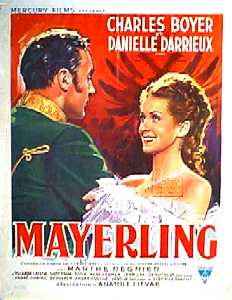Mayerling (1936 film)
This article needs additional citations for verification. (August 2011) |
| Mayerling | |
|---|---|
 Theatrical release poster | |
| Directed by | Anatole Litvak |
| Written by | Claude Anet (book) Joseph Kessel Irma von Cube |
| Produced by | Seymour Nebenzal |
| Starring | Charles Boyer Jean Dax Jean Debucourt Marthe Regnier Danielle Darrieux Suzy Prim |
| Cinematography | Armand Thirard |
| Edited by | Henri Rust |
| Music by | Arthur Honegger |
Production companies | Nero-Film Mercury Films |
| Distributed by | Pax Films (US) |
Release dates |
|
Running time | 95 minutes |
| Country | France |
| Language | French |
Mayerling is a 1936 French historical drama film directed by Anatole Litvak and produced by Seymour Nebenzal from a screenplay by Marcel Achard, Joseph Kessel, and Irma von Cube, based on the 1930 novel Idyll's End by Claude Anet.
The film stars Charles Boyer and Danielle Darrieux with René Bergeron, Jean Davy, Jean Dax, Jean Debucourt and Gabrielle Dorziat, and Jean-Louis Barrault in a bit part. The film is based on the real-life story of Crown Prince Rudolf of Austria, his affair with the 17-year-old Baroness Maria Vetsera and their tragic end at Mayerling.
The film was remade twice: once as the 1957 television film Mayerling, also directed by Anatole Litvak and starring Mel Ferrer and Audrey Hepburn, then as the 1968 film Mayerling in color by MGM, starring Omar Sharif, Catherine Deneuve, James Mason, and Ava Gardner.
Plot
[edit]Vienna is disturbed by protestors agitating for political change. Crown Prince Rudolph is arrested at a meeting. His father Emperor Franz Joseph insists he get married and settle down. Rudolph reluctantly agrees.
Five years later, Rudolph has become an unhappy playboy. On the night of his wedding anniversary he meets Baroness Marie Vetsera and they fall in love.
Cast
[edit]- Charles Boyer as Archduke Rudolph of Austria
- Jean Dax as Emperor Franz Joseph I of Austria
- Jean Debucourt as Count Taafe
- Marthe Regnier as Baroness Vetsera (Helene)
- Danielle Darrieux as Marie Vetsera
- Suzy Prim as Countess Larisch
- Vladimir Sokoloff as Chief of Police
- Andre Dubosc as Loschek the Valet
- René Bergeron as Szeps
- Gabrielle Dorziat as Empress Elisabeth
- Raymond Aimos
- Gina Manès as Marinka
- Yolande Laffron as Stephanie
Reception
[edit]Writing for The Spectator in 1936, Graham Greene gave the film a poor review, describing it as "purposeless" and "a too romantic manner for [his] taste". Greene particularly criticizes the conclusion of the film which he characterized as "a Vienna 'musical' without the music: a pathetic ending". Greene did, however, praise the film's production and acting.[1]
Restoration
[edit]A restored DVD was issued in the U.S. by The Criterion Collection (Essential Art House) on September 15, 2009.[2]
References
[edit]- ^ Greene, Graham (6 November 1936). "Dodsworth/Mayerling/Fox Hunt". The Spectator. (reprinted in: Taylor, John Russell, ed. (1980). The Pleasure Dome. Oxford University Press. pp. 113, 115. ISBN 0192812866.)
- ^ https://www.imdb.com/title/tt0027951/dvd [dead link] [user-generated source]
External links
[edit]- film review
- Mayerling at AllMovie
- Mayerling at IMDb
- Mayerling at Criterion Collection
- Film review at New York Times
- Mayerling on Lux Radio Theater: January 9, 1939
- 1936 films
- French historical drama films
- Films directed by Anatole Litvak
- Rudolf, Crown Prince of Austria
- 1930s historical drama films
- Films set in 1884
- Films set in 1889
- Films set in Vienna
- Biographical films about Austrian royalty
- Cultural depictions of Empress Elisabeth of Austria
- Cultural depictions of Franz Joseph I of Austria
- French black-and-white films
- Films scored by Arthur Honegger
- 1936 drama films
- Films set in Austria-Hungary
- 1930s French films
- 1930s French-language films
- French-language historical drama films
- Historical film stubs
- 1930s French film stubs